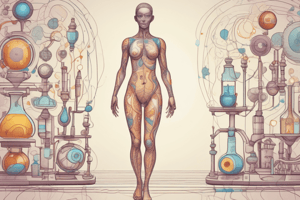Podcast
Questions and Answers
What is the primary response to primary respiratory acid-base changes?
What is the primary response to primary respiratory acid-base changes?
- Cellular buffers (correct)
- Respiratory compensatory mechanisms
- Metabolic compensation
- Renal compensatory mechanisms
What is the primary mechanism of renal compensation for respiratory acidosis?
What is the primary mechanism of renal compensation for respiratory acidosis?
- Decreased excretion of hydrogen ions
- Increased excretion of bicarbonate ions
- Increased reabsorption of hydrogen ions
- Increased urinary excretion of hydrogen ions and resorption of bicarbonate ions (correct)
What is the result of the body producing too much acid or reducing the excretion of acid?
What is the result of the body producing too much acid or reducing the excretion of acid?
- Metabolic acidosis (correct)
- Respiratory acidosis
- Metabolic alkalosis
- Renal failure
What is the duration of the renal compensation process for respiratory acidosis?
What is the duration of the renal compensation process for respiratory acidosis?
What is the primary role of buffer systems in the body?
What is the primary role of buffer systems in the body?
What is the consequence of not addressing acid-base disturbances?
What is the consequence of not addressing acid-base disturbances?
What is the primary function of the kidneys in regulating acid-base balance?
What is the primary function of the kidneys in regulating acid-base balance?
How do buffer systems maintain pH balance?
How do buffer systems maintain pH balance?
What is the result of the lungs regulating the amount of carbon dioxide exhaled?
What is the result of the lungs regulating the amount of carbon dioxide exhaled?
What is the primary mechanism of respiratory compensation?
What is the primary mechanism of respiratory compensation?
What is the consequence of abnormalities in acid-base balance?
What is the consequence of abnormalities in acid-base balance?
What is the purpose of the body's acid-base balance regulation?
What is the purpose of the body's acid-base balance regulation?
Study Notes
Acid-Base Balance: Regulation, Buffer Systems, and Compensation
Acid-base balance refers to the balance between acidity and alkalinity in the body. The body strictly regulates this balance to maintain a healthy environment for cells and organs. Abnormalities in acid-base balance can lead to serious health issues. This article discusses the regulation of acid-base balance, buffer systems, compensation mechanisms, and the impact of acid-base disturbances on the body.
pH Regulation
The body has two primary mechanisms for regulating pH: the respiratory system and the kidneys. The lungs regulate pH through the release of carbon dioxide, a mildly acidic waste product of cellular metabolism. The lungs also regulate the amount of carbon dioxide exhaled, which can affect the pH of the blood. The kidneys help maintain pH by excreting excess acids or bases, but their adjustments occur more slowly than the lungs'.
Buffer Systems
Buffer systems, such as carbonic acid and bicarbonate ions, are used to prevent sudden shifts in pH. These weak acids and bases exist in pairs that are in balance under normal pH conditions. They work chemically to maintain the pH of a solution by adjusting the proportion of acid and base, thus minimizing changes in the pH.
Respiratory Compensation
Respiratory compensation involves modifying the amount of carbon dioxide exhaled to maintain pH balance. Primary respiratory acid-base changes are initially adjusted by cellular buffers, with renal compensatory mechanisms gradually responding to these changes.
Renal Compensation
Renal compensation for respiratory acidosis occurs through increased urinary excretion of hydrogen ions and resorption of bicarbonate ions. This process is slower than respiratory compensation and takes several days.
Metabolic Acidosis
Metabolic acidosis occurs when the body produces too much acid or reduces the excretion of acid. This can be caused by increased acid production, reduced excretion of acid, or a combination of both. Symptoms may include headache, confusion, increased heart rate, and difficulty breathing.
In summary, the body's acid-base balance is stringently regulated through the respiratory system, kidneys, and buffer systems. Compensatory mechanisms are in place to counteract acid-base disturbances, but these disturbances can still lead to serious health issues if not addressed. Understanding these processes is crucial for maintaining overall health and preventing complications.
Studying That Suits You
Use AI to generate personalized quizzes and flashcards to suit your learning preferences.
Description
Learn about the body's regulation of acid-base balance, including the role of the respiratory system, kidneys, and buffer systems. Understand how compensatory mechanisms respond to acid-base disturbances and the impact on overall health.




